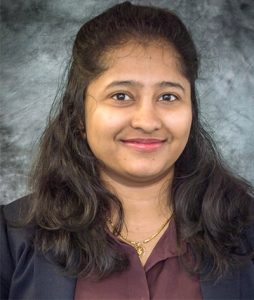May 06, 2020

Samaikya Valluripally
Name
Samaikya Valluripally
Hometown
Hyderabad, India
Major
PhD, Computer Science
Faculty Advisor
Prasad Calyam
Where did you complete your undergraduate study?
MS, Computer Science, University of Missouri; Bachelor of Technology, Computer Science, Jawaharlal Nehru Technological University, India
Why did you choose Mizzou for your graduate program?
I chose Mizzou to pursue a master’s degree in Computer Science mainly because I got to know from the students about the extensive research facilities and the exposure international students get with the opportunities offered by the peerless faculty at Mizzou. I happen to share my areas of interest with the faculty in the EECS department especially Dr. Calyam who is currently my thesis advisor. In addition, the financial support offered by the EECS department and the stimulating academic environment for incoming students made me decide to go to Mizzou.
With the best experience and the encouragement I’ve gained during the course of my master’s degree, I continued at Mizzou to pursue a PhD degree in the EECS department.
Tell us about your graduate research. What are some potential outcomes or applications?
Cloud-based applications (e.g., Health information sharing, video big data analytics and IoT-based learning applications) are increasingly being deployed at high scale in distributed environments. Despite the exponential growth of cloud platforms over the years, cloud-based applications have unique demands such as seamless control, continuous feedback and auto assurance. Existing cloud-based applications lack mechanisms to maintain robustness and performance as a joint consideration. Due to this lack of inter-dependency of performance and security facets in current system designs, applications experience performance issues (e.g., latency in data accessibility) and are vulnerable to sophisticated cyber attacks (e.g. application and network-based attacks) that impact overall user experience. For instance, a traffic delay, can potentially cause an unavailability of a service or data which can be used as a vulnerability by an attacker to trigger a potential Denial of Service (DoS) attack. Inappropriate design of the applications can consequently cause harm to end users (e.g. delay in decision making related to patient care, endangering user safety, disruption of user experience). It is imperative that cloud-based applications are co-designed with joint methods to tune performance and robustness for facilitating seamless interactions, secured interoperability and satisfactory user experience.
My research presents a novel framework that jointly tunes performance and robustness using a novel ‘DevSecOps’ paradigm for cloud-based applications. Traditionally, user experience is only confined to assessment of application factors (e.g., application audio/video quality) and security is rarely considered in the context of user experience. However, my thesis focuses on characterization of several robustness factors Security, Privacy and Safety (SPS) and performance factors Quality of Application, Quality of Service, Quality of Experience (3Q) that jointly affect user experience of an application. Using an IoT based learning application (Virtual Reality Learning Environment: VRLE) as an exemplar application, my research investigates a co-design of performance and security factors, to understand how certain components of the system and corresponding user interactions trigger bottlenecks and cause vulnerability to attacks. Another application of my research is for a health-information sharing application to increase data accessibility for protected health data sets. The potential outcome of my research was to develop a semi-automated honest broker solution that relies on tuning performance and security approach as a co-design.
With this, the broader impact of my research work can aid the NextGen Precision Health Initiative at Mizzou, where the researchers and collaborators can work together, get the computational resources faster. By meeting the computational needs of a healthcare researcher and clinicians an effective and an efficient decision can be taken related to patient care in precision medicine area. Further, the foundations and tools developed from my research can be broadly extended to a variety of cloud-based applications that are vital to our society in e.g., public safety, healthcare and manufacturing.
What are some accomplishments you’ve achieved at Mizzou that you’re especially proud of?
In my 6 years at MU, I completed my MS degree in 2016 and finished my PhD comprehensive exam in 2019. With the continuous encouragement and esteemed guidance from my thesis advisor Dr. Calyam, I accomplished nine publications in several top-tier journals and conferences. Due to this, I got the opportunity to attend several top-tier conferences to present my papers and to discuss my research work. I had the privilege to work with peerless faculty, including Dr. Prasad Calyam, Dr. Khaza Anuarul Hoque, Dr. Isa Jahnke and Dr. Henry He closely for my research, and I helped in securing a new NSF funding. I got the opportunity to mentor several graduate/undergraduate students including the REU summer students and fellow graduate students.
In addition, I was recognized for my research contributions to the College of Engineering at Mizzou and was given the 1907 Women in Engineering Student award in 2018 by Dean Elizabeth Loboa. Also, I have been awarded the Electrical Engineering and Computer Science Departmental Excellence Fellowship for the Fall 2019/Spring 2020 Academic year for my academic achievements and research contributions in Mizzou.
What do you hope to do after you complete your degree?
With the invaluable experience I gained so far at Mizzou, I plan to work in a Research & Development Lab to enhance my knowledge and skills and use them for the development of the community.